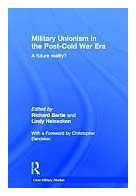|
||
• wydawnictwa polskie
• Zamów informacje o nowościach z wybranego tematu • kontakt
• Cookies na stronie |
MILITARY UNIONISM IN THE POST-COLD WAR ERABARTLE R. HEINECKEN L.wydawnictwo: ROUTLEDGE , rok wydania 2013, wydanie Icena netto: Military Unionism In The Post-Cold War EraThis unique study of military unionism shows how the changing nature of present day conflicts has made soldier representation more important then ever. This new collection of essays clearly establish the key factors in the military union debate in recent years and highlight the mechanisms different armed forces have created to deal with the aspirations of their members. Core issues covered include: the nature of organizational and force restructuring since the end of the Cold War the new structures of military employment changes in value systems, such as rising individualism and the new culture of recruits legal, political, social and economic factors driving the debate. Placing military unionism in comparative perspective, these chapters provide the reader with an excellent basis for the examination of international military unionism from the viewpoint of countries with no unions, those recently unionised and those unionised for some time. This new book will be of great interest to students, researchers and professionals in military studies, defence management and sociology of the armed forces. Part 1. Countries with No Unions 1. United Kingdom 2. Canada 3. France 4. Italy Part 2. Countries Recently Unionised 5. South Africa 6. Ireland 7. Australia 8. Slovenia or Ukraine Part 3. Countries Unionised for Some Time 9. Germany 10. Netherlands 11. Denmark 12. Belgium 240 pages, Paerback Księgarnia nie działa. Nie odpowiadamy na pytania i nie realizujemy zamówien. Do odwolania !. |


